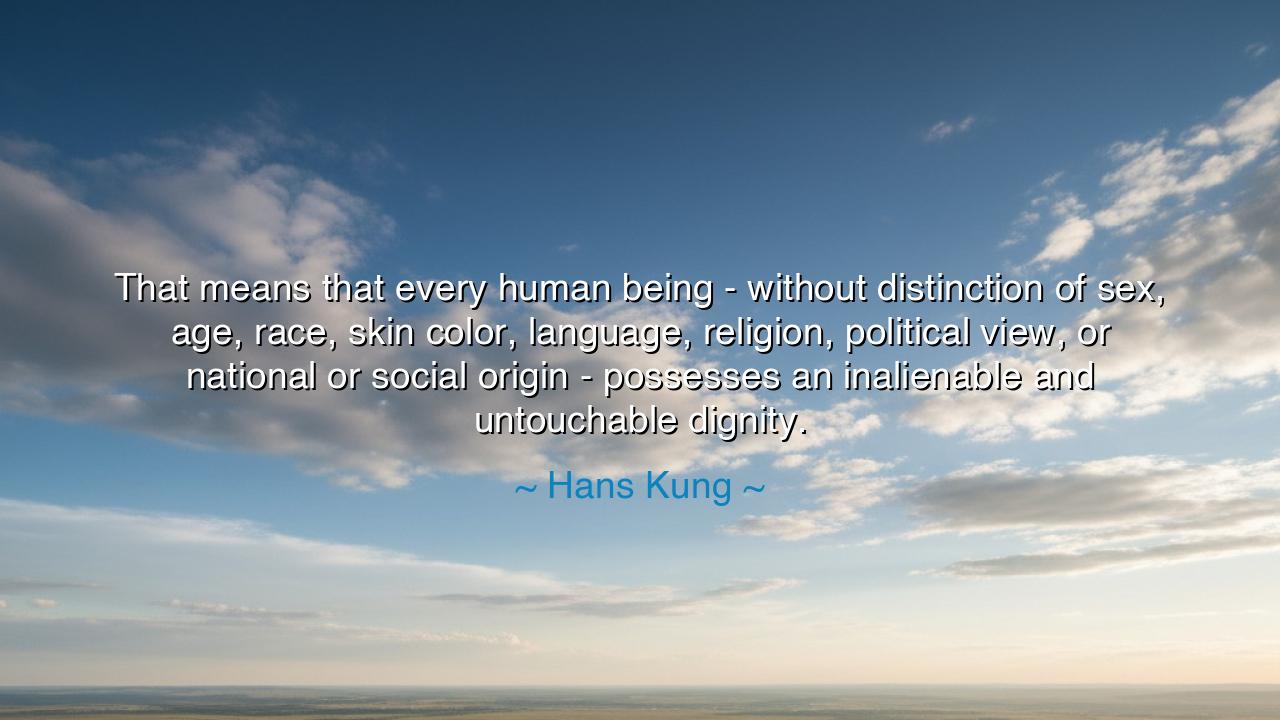
That means that every human being - without distinction of sex
That means that every human being - without distinction of sex, age, race, skin color, language, religion, political view, or national or social origin - possesses an inalienable and untouchable dignity.






The words of Hans Küng—“That means that every human being—without distinction of sex, age, race, skin color, language, religion, political view, or national or social origin—possesses an inalienable and untouchable dignity”—resound like a clarion call to the conscience of humanity. They do not merely state a principle; they declare a truth older than kingdoms and higher than thrones: that dignity is not bestowed by governments, nor earned by merit, nor revoked by power. It is woven into the very essence of the human being, breathed into us by the Source of life itself.
The origin of such words springs from Küng’s lifelong devotion to interfaith dialogue, to peace, and to the building of a world founded on mutual respect. As a theologian who dared to challenge narrowness and division, he sought to remind mankind that before we are divided by nation, tongue, or creed, we are united by something deeper: our shared humanity. These words echo not only in halls of theology but in the hearts of all who have seen the wounds of prejudice and the chains of oppression. For history teaches us that when this truth is forgotten, tyranny rises, and when it is remembered, justice flourishes.
Consider the great tragedy and triumph of the Civil Rights Movement in the United States. For centuries, men and women of color were denied the dignity that was theirs by right of birth. Laws enslaved them, customs degraded them, and violence sought to silence them. Yet leaders like Martin Luther King Jr. rose with prophetic fire, proclaiming that dignity cannot be erased by hatred. When he declared, “I have a dream,” it was the same spirit that Küng speaks of: a vision of a world where the worth of a person is measured not by outward marks, but by the eternal flame of humanity within.
History gives us another witness in the struggle against apartheid in South Africa. For decades, a cruel system denied basic rights to the majority of its people. Yet when Nelson Mandela walked free from prison after twenty-seven years, he did not demand vengeance but insisted on reconciliation, rooted in the recognition of human dignity. His leadership revealed what Küng’s words affirm: that dignity is not granted by rulers; it is the birthright of all. And when this truth is acknowledged, nations are healed, and humanity ascends to higher ground.
Yet Küng also warns us indirectly: when societies forget the inalienable nature of dignity, they fall into ruin. The empires of old, built upon slavery and conquest, crumbled not because they lacked wealth or armies, but because they denied the humanity of those they subjugated. The lesson is written in the ashes of history: no civilization can endure long when it tramples upon the dignity of its people. To honor dignity is to build on stone; to scorn it is to build on sand.
The lesson for us is clear: each of us is a guardian of this truth. It is not enough to proclaim dignity in words; we must live it in action. To respect the poor as much as the rich, to honor the stranger as much as the friend, to see in every face—whether wrinkled by age or marked by difference—the reflection of something eternal. We must train our eyes to pierce beyond the outer veil of race, religion, or nationality, and see the sacred worth within.
Practically, let us begin with small acts of reverence. Speak with kindness to those who are ignored. Defend the oppressed, even when it costs you comfort. Refuse to repeat the lies of prejudice, and instead, proclaim the truth of equality. Teach the young that their worth is untouchable, and remind the old that their dignity is unbroken. In doing so, you not only honor others, but you rise into the fullness of your own humanity.
Thus, Hans Küng’s words endure as a commandment for our age: every human being bears an inalienable and untouchable dignity. It is the golden thread that binds us together, the foundation of justice, and the hope of peace. Let no generation forget it, and let each of us live so that when we are remembered, it may be said: here was one who honored the dignity of all, and in so doing, reflected the eternal truth of the divine.






AAdministratorAdministrator
Welcome, honored guests. Please leave a comment, we will respond soon